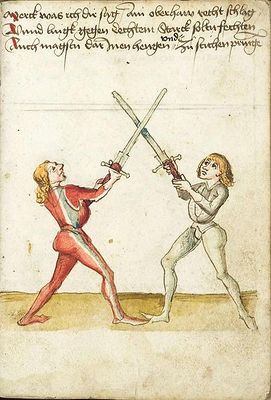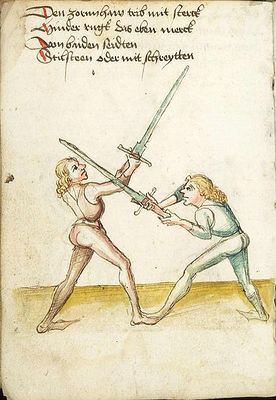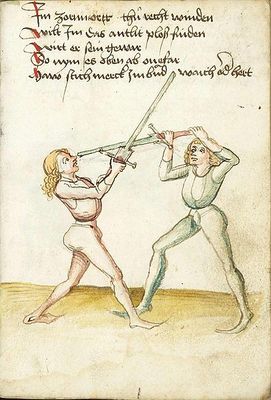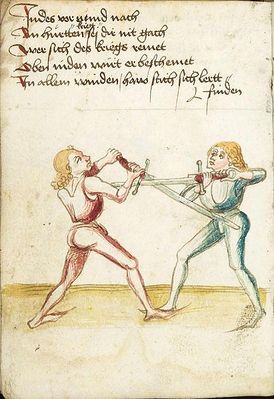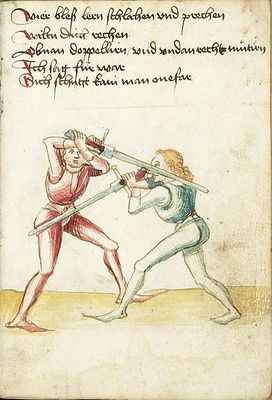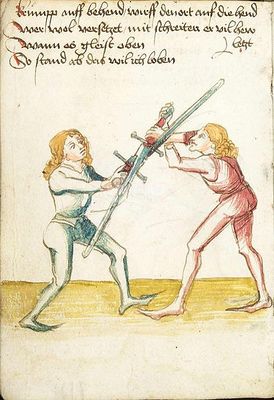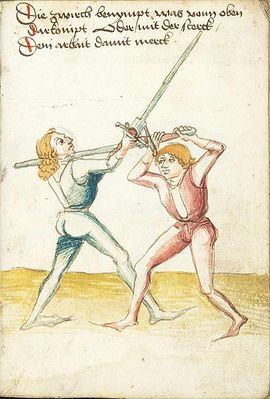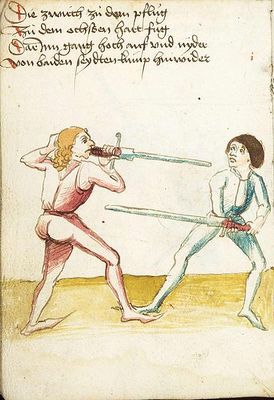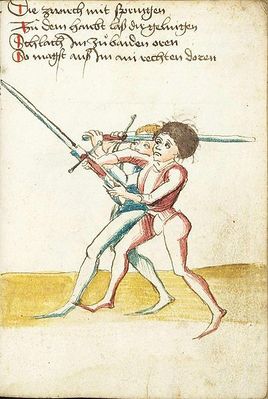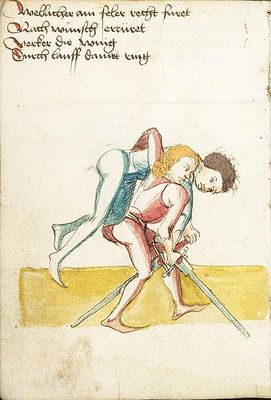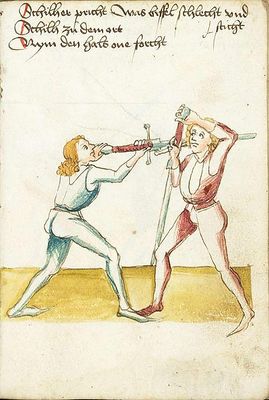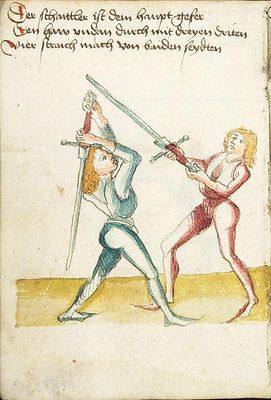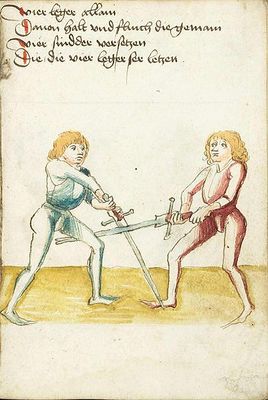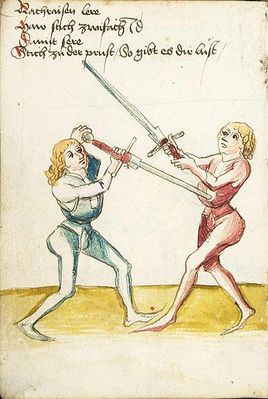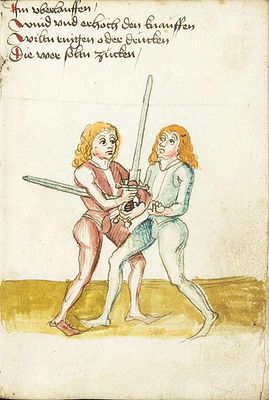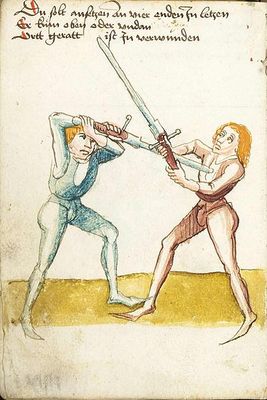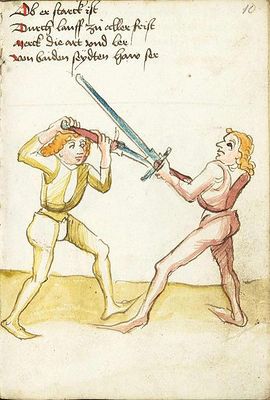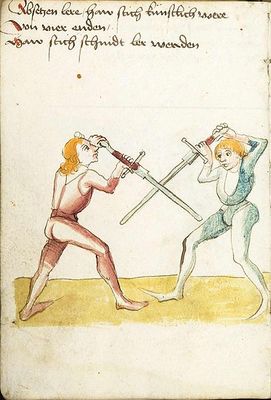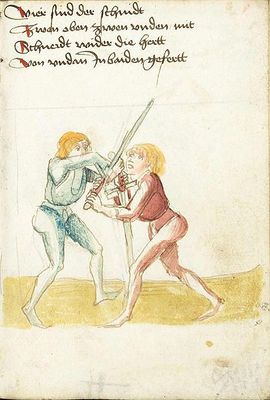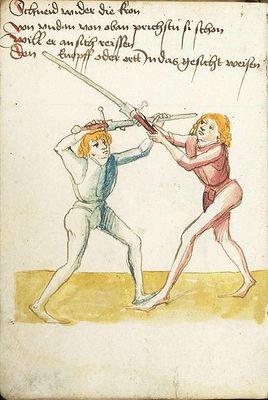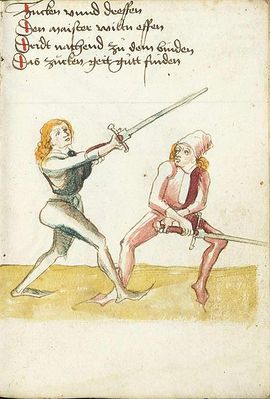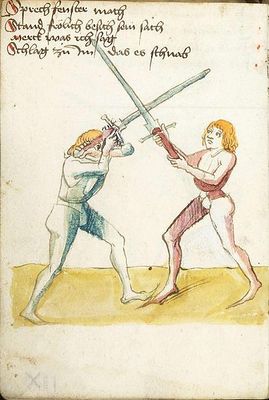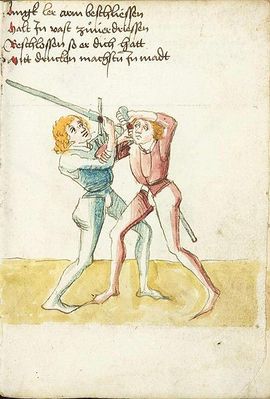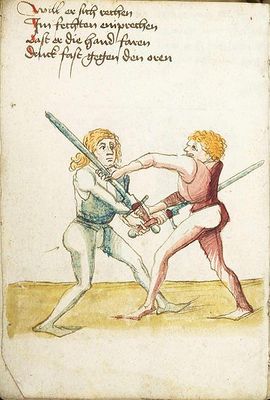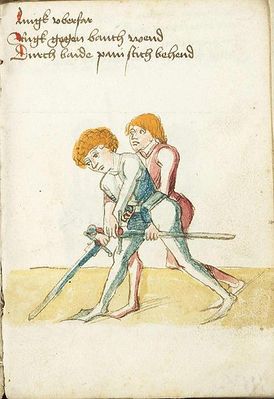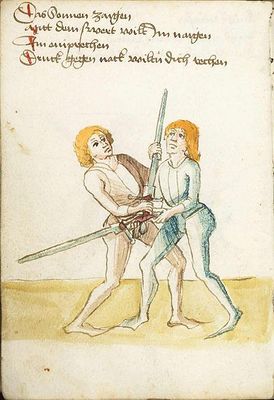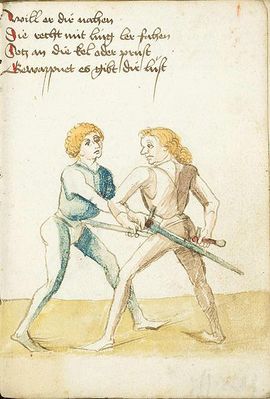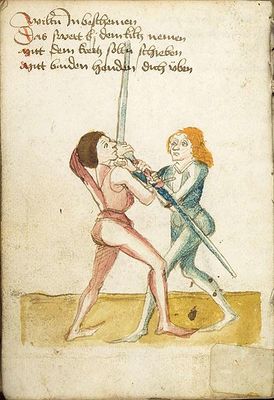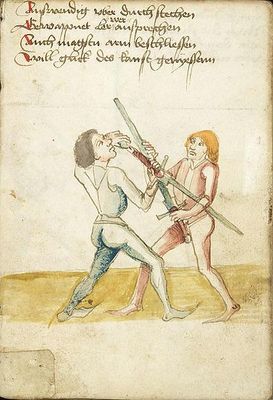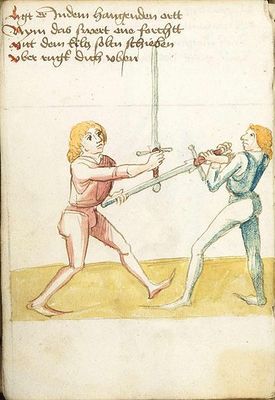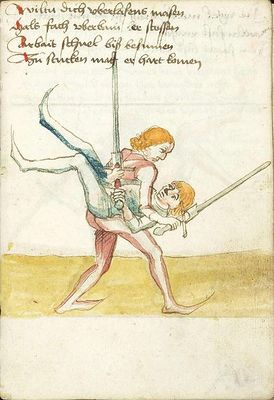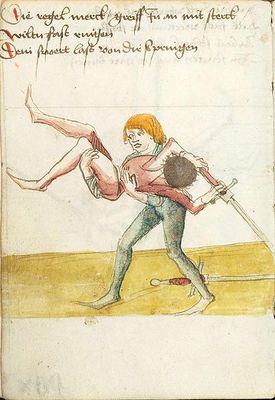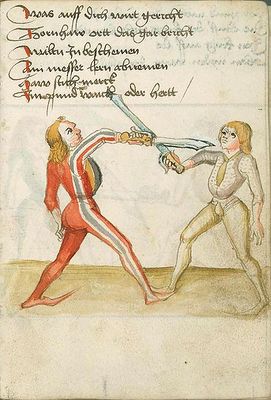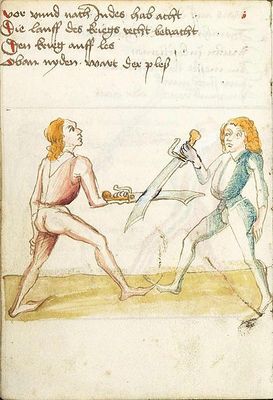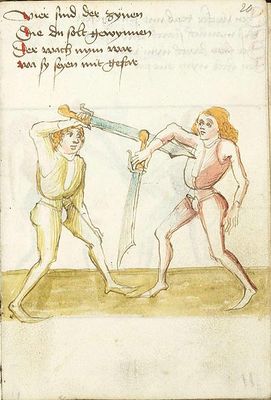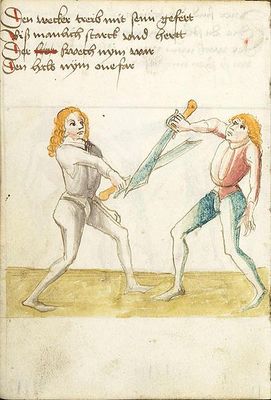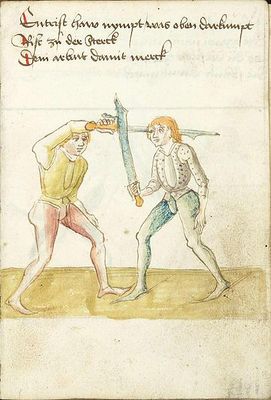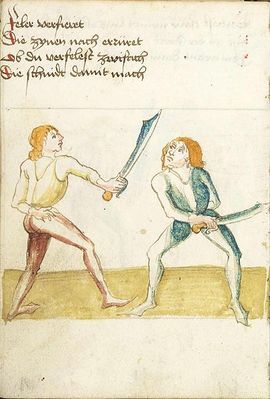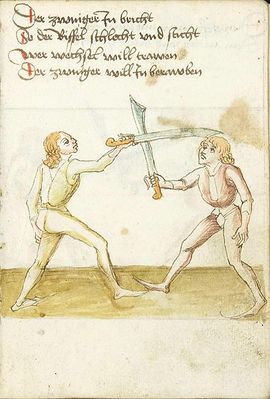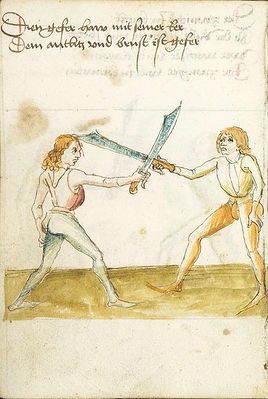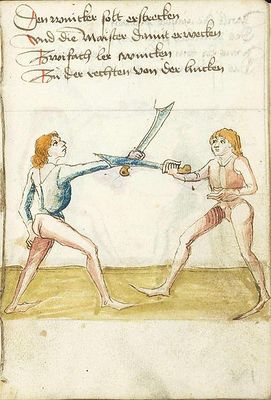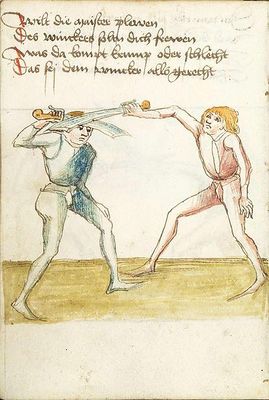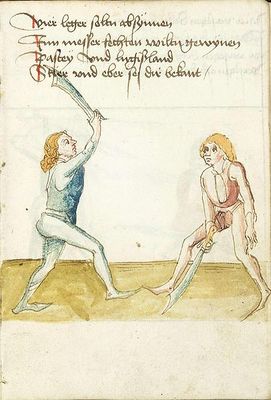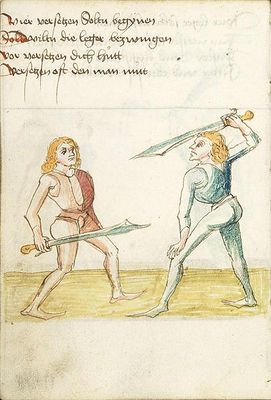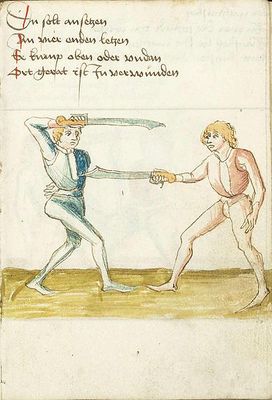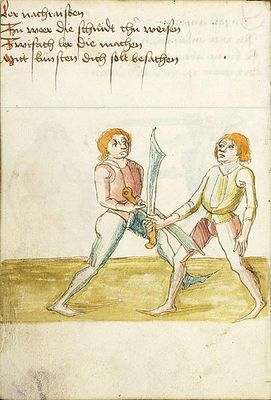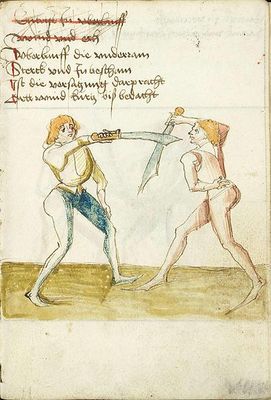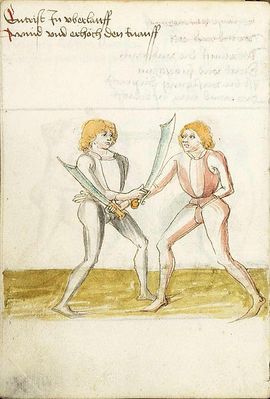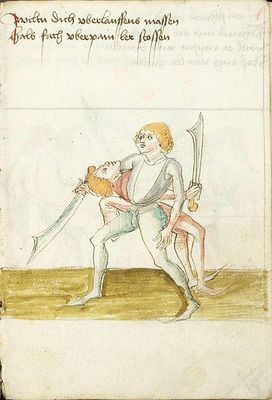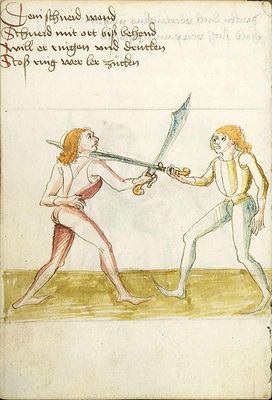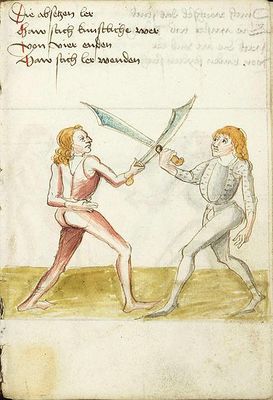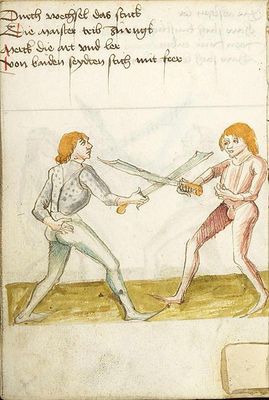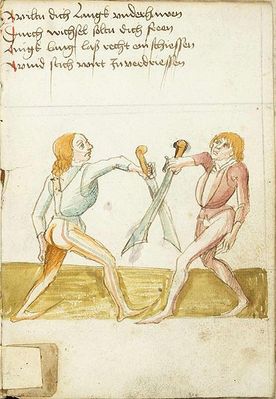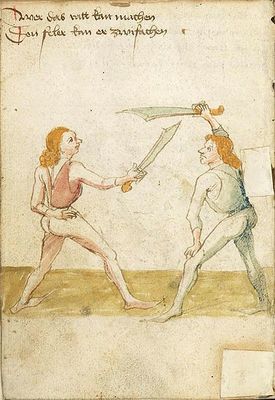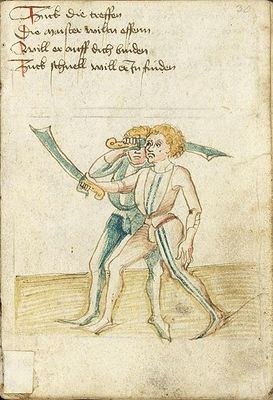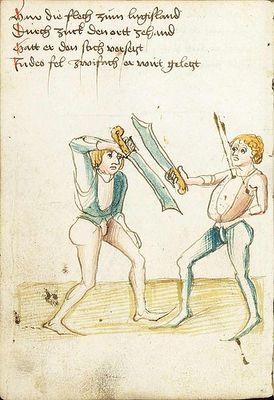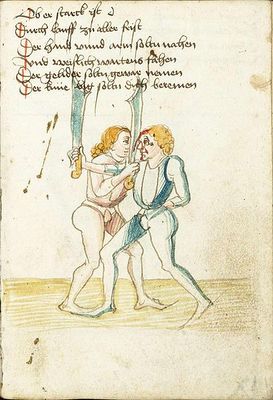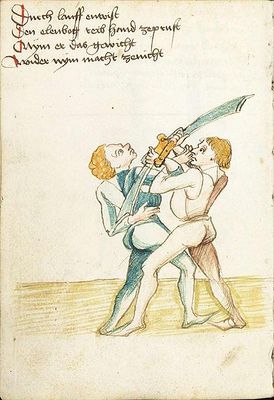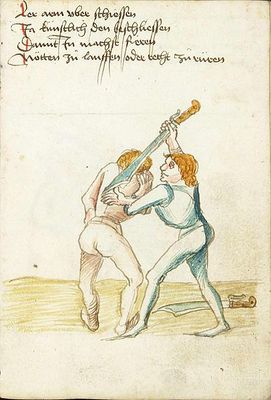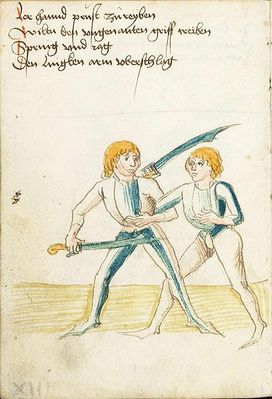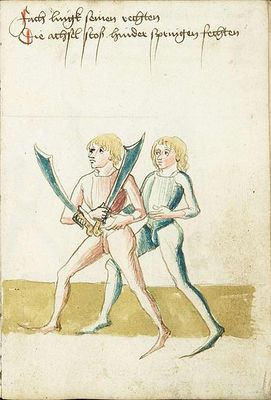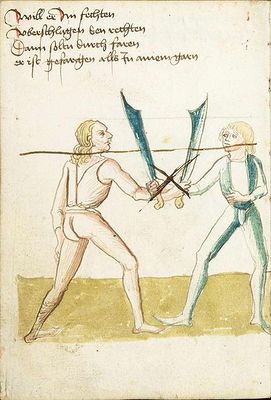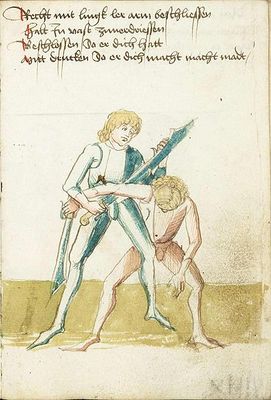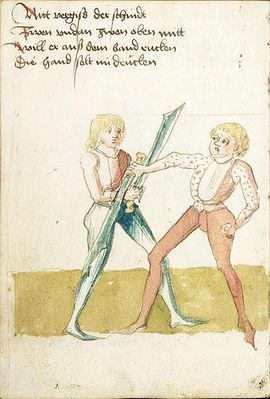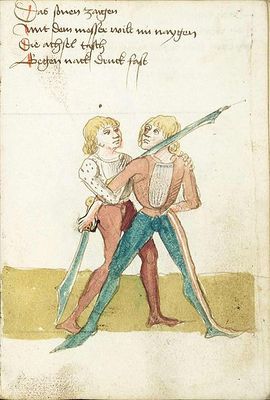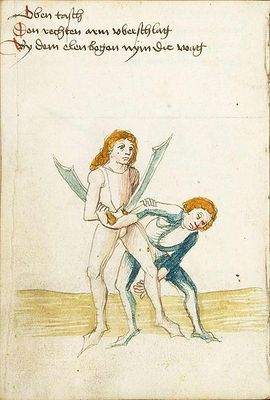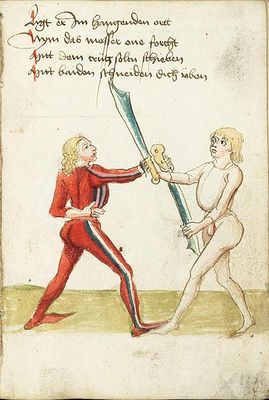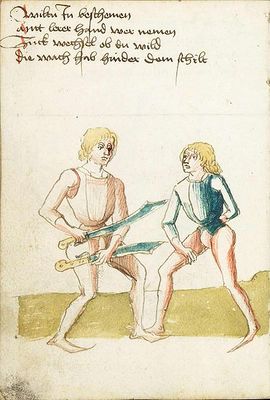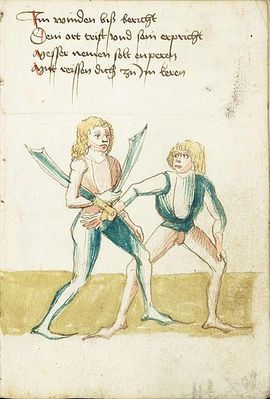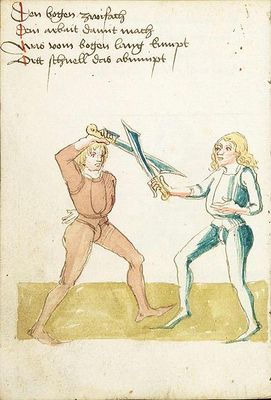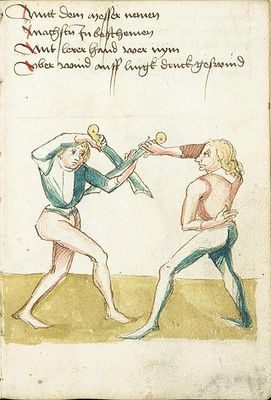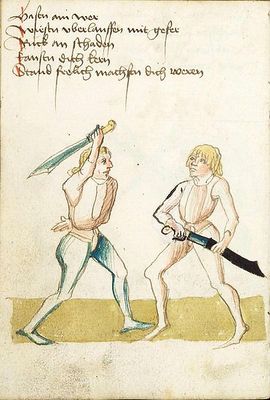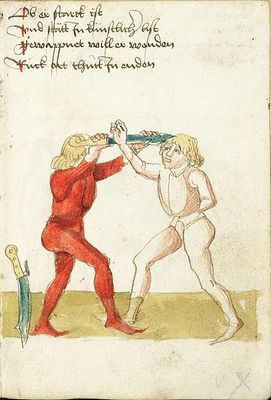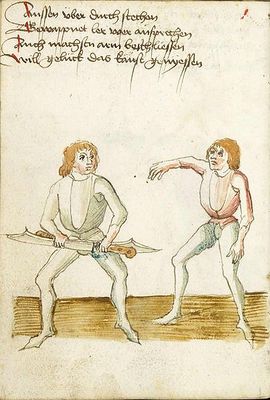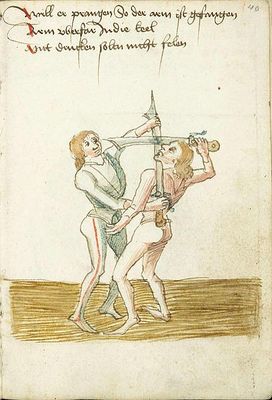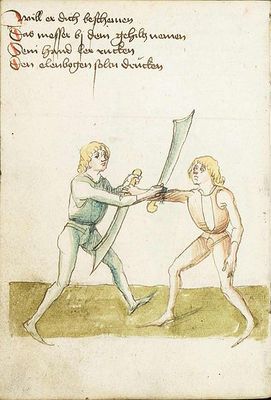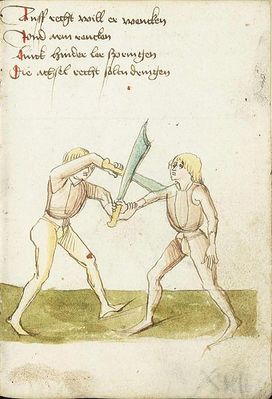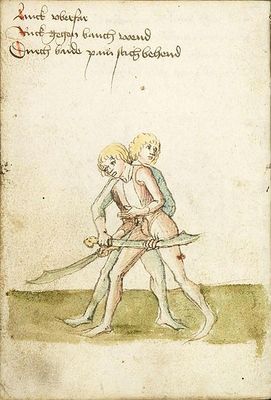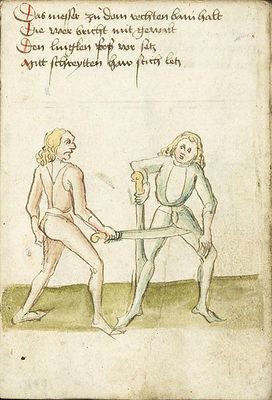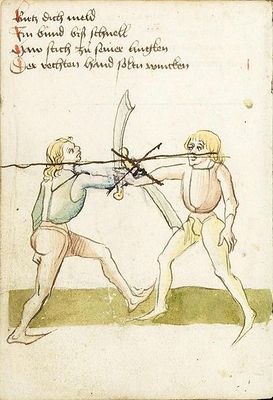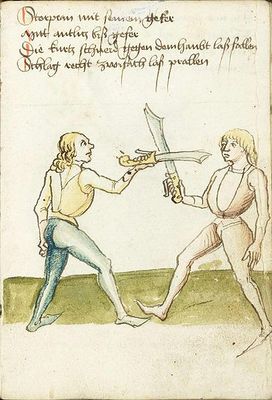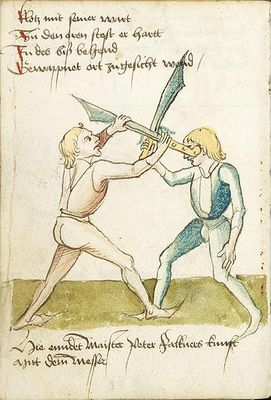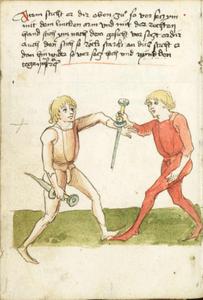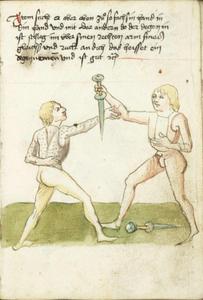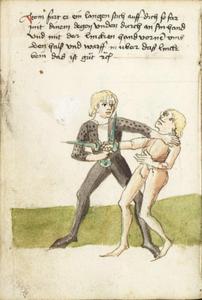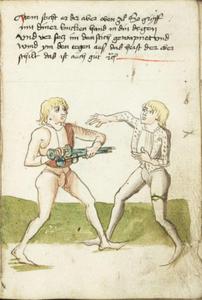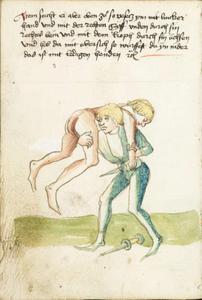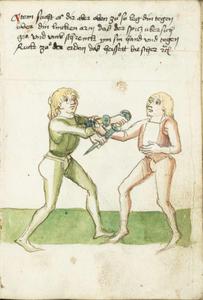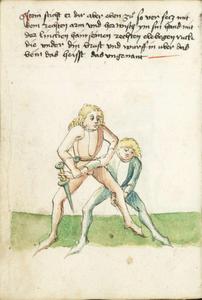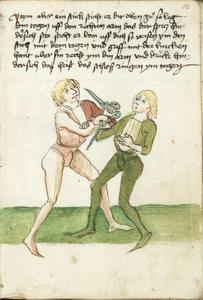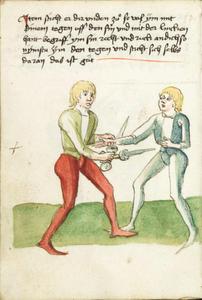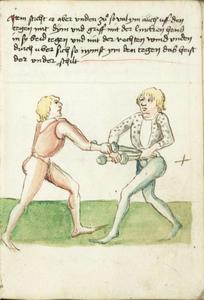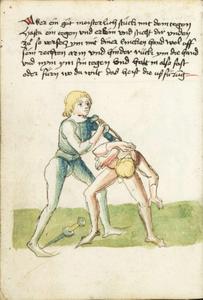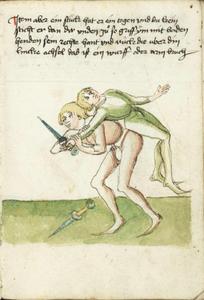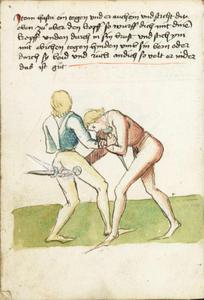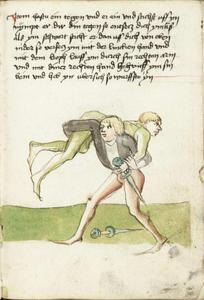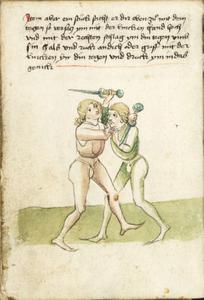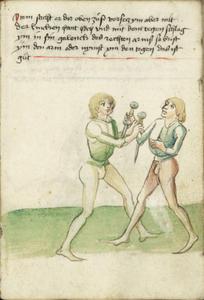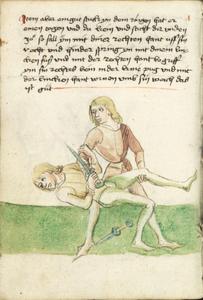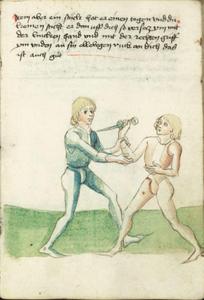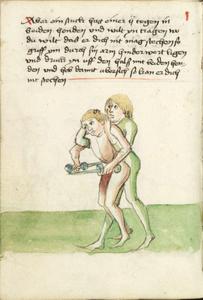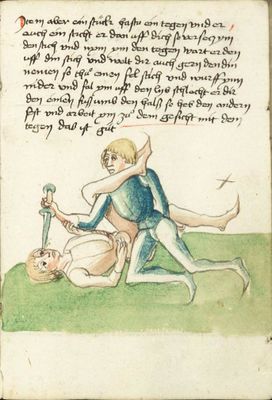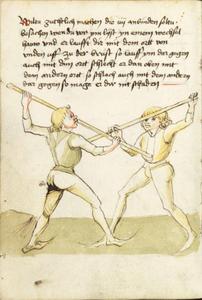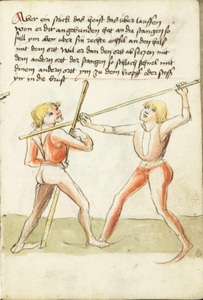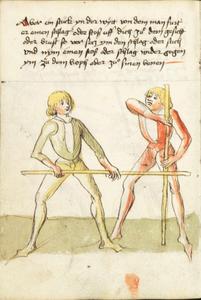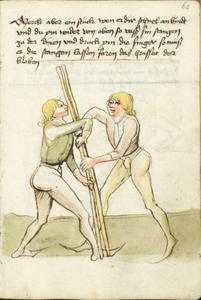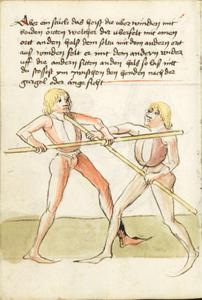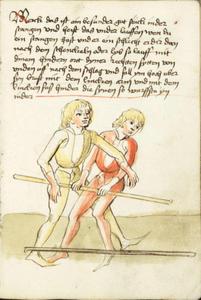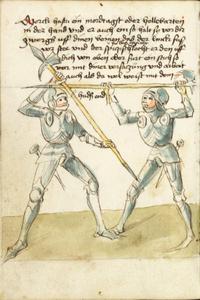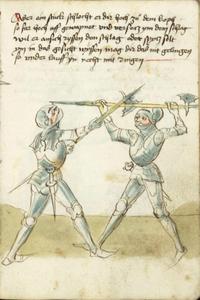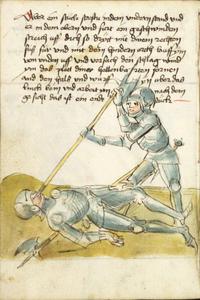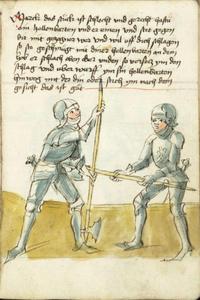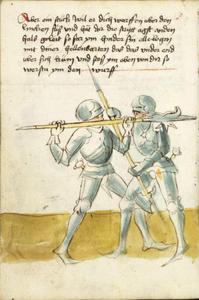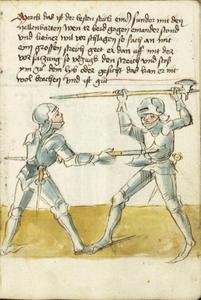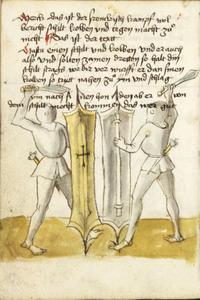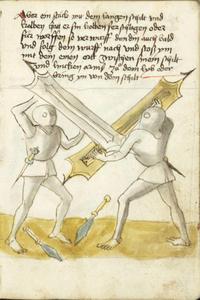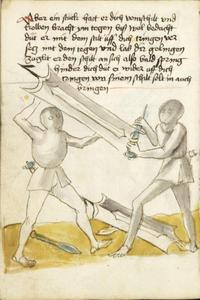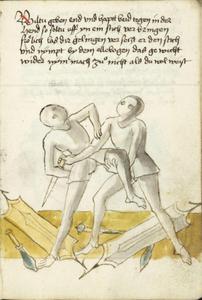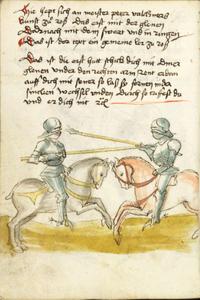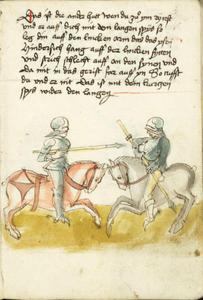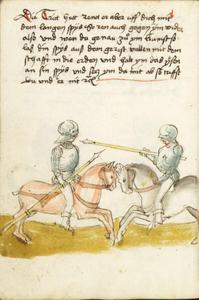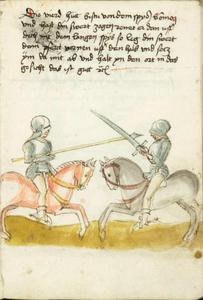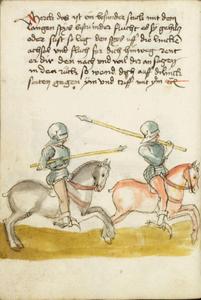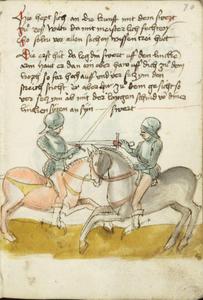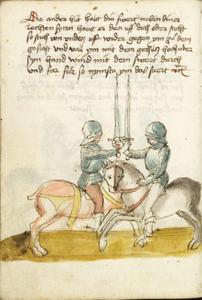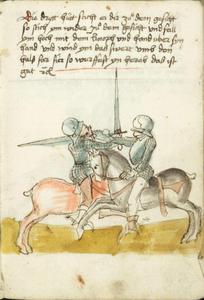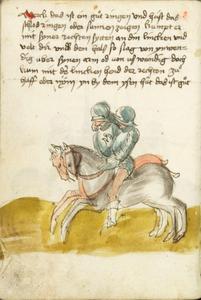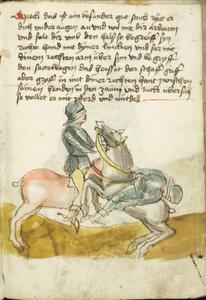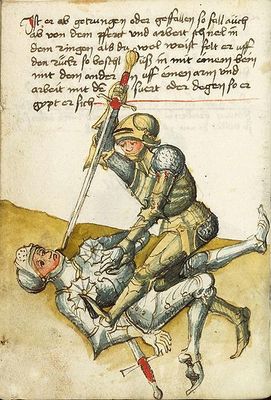|
|
You are not currently logged in. Are you accessing the unsecure (http) portal? Click here to switch to the secure portal. |
Difference between revisions of "Peter Falkner"
| Line 1,067: | Line 1,067: | ||
|- | |- | ||
! id="thin" | <p>Images</p> | ! id="thin" | <p>Images</p> | ||
| − | ! <p>{{rating}}</p> | + | ! <p>{{rating|D}}<br/>by [[translator::Philippe Charlebois]]</p> |
! <p>Transcription<br/>by [[Dierk Hagedorn]]</p> | ! <p>Transcription<br/>by [[Dierk Hagedorn]]</p> | ||
|- | |- | ||
| rowspan="2" | [[File:MS KK5012 65v.jpg|400x400px|center|link=http://commons.wikimedia.org/wiki/File:Ms._KK5012_65v.jpg]] | | rowspan="2" | [[File:MS KK5012 65v.jpg|400x400px|center|link=http://commons.wikimedia.org/wiki/File:Ms._KK5012_65v.jpg]] | ||
| − | | | + | | '''[65v]''' Note that this is the Frankish combat. Well prepared, the shield, mace and dagger neutralize. |
| '''[65v]''' Merck daß ist der frenckisch kampf wol bericht schilt kolben vnd tegen macht zu° nicht | | '''[65v]''' Merck daß ist der frenckisch kampf wol bericht schilt kolben vnd tegen macht zu° nicht | ||
|- | |- | ||
| − | | | + | | '''That is the text''' |
| + | If you have a shield and a mace and him also, and that you should tread together, so hold your shield straight in front of you. If he cast his mace, so step close to him and strike him at his hands. He must let the shield away. That was good. | ||
| '''Das is der text''' | | '''Das is der text''' | ||
Hastu einen schilt vnd kolben vnd er auch also vnd solten zamen dretten so halt din schilt strags vor dir ver wurfft er dan sinen kolben so trÿtt nahen zu° ÿm vnd schlag ÿm nach sinen henden ab er von dem schilt mecht kommen das wer güt | Hastu einen schilt vnd kolben vnd er auch also vnd solten zamen dretten so halt din schilt strags vor dir ver wurfft er dan sinen kolben so trÿtt nahen zu° ÿm vnd schlag ÿm nach sinen henden ab er von dem schilt mecht kommen das wer güt | ||
| Line 1,082: | Line 1,083: | ||
|- | |- | ||
| [[File:MS KK5012 66r.jpg|400x400px|center|link=http://commons.wikimedia.org/wiki/File:Ms._KK5012_66r.jpg]] | | [[File:MS KK5012 66r.jpg|400x400px|center|link=http://commons.wikimedia.org/wiki/File:Ms._KK5012_66r.jpg]] | ||
| − | | | + | | '''[66r]''' Another piece with the longshield and the mace. If he has broken or casted his mace, then cast also yours right away and follow closely the throw and thrust him with your point between his shield and his left arm to the body or bring him away from his shield. |
| '''[66r]''' Aber ein stück mit dem langen schilt vnd kolben hatt er sin kolben fer schlagen oder für worffen so ver wurff den din auch bald vnd folg dem wurff nach vnd stoß ym mit dein einen ortt zwischen sinem schilt vnd lincken armß zu° dem lyb oder bring yn von dem schilt | | '''[66r]''' Aber ein stück mit dem langen schilt vnd kolben hatt er sin kolben fer schlagen oder für worffen so ver wurff den din auch bald vnd folg dem wurff nach vnd stoß ym mit dein einen ortt zwischen sinem schilt vnd lincken armß zu° dem lyb oder bring yn von dem schilt | ||
|- | |- | ||
| [[File:MS KK5012 66v.jpg|400x400px|center|link=http://commons.wikimedia.org/wiki/File:Ms._KK5012_66v.jpg]] | | [[File:MS KK5012 66v.jpg|400x400px|center|link=http://commons.wikimedia.org/wiki/File:Ms._KK5012_66v.jpg]] | ||
| − | | | + | | '''[66v]''' Another piece. If he has brought you away from the shield and the mace, be very prudent with the dagger. If he points strongly at you with the shield, displace with the dagger and allow yourself to be gained. If he pulls the shield at him, jump right away behind you. If he points again strongly at you, you must also bring him away from his shield. |
| '''[66v]''' Aber ein stück hatt er dich vom schilt vnd kolben bracht ym tegen biß wol bedacht düt er mit dem scilt üff dich tringen ver secz mit dem tegen vnd las dir gelingen zugkt er den schilt an sich also bald spring hinder dich düt er wider uff dich tringen von sinem schilt solt in auch bringen | | '''[66v]''' Aber ein stück hatt er dich vom schilt vnd kolben bracht ym tegen biß wol bedacht düt er mit dem scilt üff dich tringen ver secz mit dem tegen vnd las dir gelingen zugkt er den schilt an sich also bald spring hinder dich düt er wider uff dich tringen von sinem schilt solt in auch bringen | ||
|- | |- | ||
| [[File:MS KK5012 67r.jpg|400x400px|center|link=http://commons.wikimedia.org/wiki/File:Ms._KK5012_67r.jpg]] | | [[File:MS KK5012 67r.jpg|400x400px|center|link=http://commons.wikimedia.org/wiki/File:Ms._KK5012_67r.jpg]] | ||
| − | | | + | | '''[67r]''' If you want to end the combat and you both have in the hand, so you must present him a thrust, let yourself to be gained merrily. Then, he displaces the thrust and takes [your] balance by the elbow. Take [it] back and neutralize him as you well know. |
| '''[67r]''' Wiltu geben end vnd haptt beid tegen in der hend so soltu uff yn ein stich ver bringen frölich las dir gelingen ver seczt er den stich vnd nÿmpt by dem ellebogen das ge wicht wider nÿm mach zu° nicht als du wol weist | | '''[67r]''' Wiltu geben end vnd haptt beid tegen in der hend so soltu uff yn ein stich ver bringen frölich las dir gelingen ver seczt er den stich vnd nÿmpt by dem ellebogen das ge wicht wider nÿm mach zu° nicht als du wol weist | ||
Revision as of 03:49, 17 August 2018
| Peter Falkner | |
|---|---|
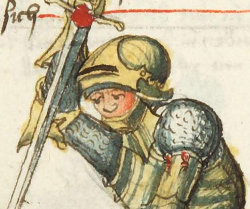 | |
| Born | ca. 1460s |
| Died | after 1506 |
| Occupation | Fencing master |
| Citizenship | Frankfurt am Main, Germany |
| Movement | Marxbrüder |
| Influences | |
| Influenced | |
| Genres | Fencing manual |
| Language | Early New High German |
| Notable work(s) | Kunste Zu Ritterlicher Were |
| Manuscript(s) | MS KK5012 (1495) |
| First printed english edition |
Tobler, 2011 |
| Translations | Deutsch-Übersetzung |
Peter Falkner (Peter Faulkner, Petter Falckner) was a 15th century German Master of the Longsword. He seems to have been a resident of Frankfurt am Main, and he was certified as a master by the Marxbrüder some time before 1491.[1] Falkner was a witness of record to the guild's biannual treasury accounting in 1496, a task he performed again in 1506.[1] In 1502, he was elected as Captain (Hauptman) of the guild, and he seems to have served an unusual three consecutive terms.[1][2]
In ca. 1495,[3] he produced a manuscript fencing manual, Kunste Zu Ritterlicher Were (MS KK5012), the earliest such text produced by a member of the brotherhood (with the potential exception of Hans Talhoffer, whose membership is uncertain). Falkner's work resembles to some extent the earlier treatises of Paulus Kal, which may have been his inspiration, and his writings may in turn have influenced Jörg Wilhalm Hutter and the anonymous author of the MS Cl. 23842.[4]
Contents
Treatise
Images |
Transcription | |
|---|---|---|
|
Young Knight, learn to love God and Women |
[01v] Jungk Ritter Lern gott lieb haben / und frawen | |
|
Learn the Six Strikes |
Sechs hew lern | |
|
Over Hew |
Oberhaw | |
|
Note what I say to you |
[02r] Merck was ich dir sag / Ain oberhaw recht schlag / | |
|
Deploy the wrath hew with strength. |
[02v] Den zornnhaw trib mit sterck | |
|
Do the right winding in the wrath point |
[03r] In zornnortt thu° recht winden | |
|
In-the-moment[12] before and after |
[03v] Indes vor vnnd nach | |
|
Learn to strike and to break the four openings. |
[04r] Vier bleß lern schlahen vnd prechen | |
|
Crook upon swiftly |
[04v] Krumpp auff behend / wirff den ort auf die hend | |
|
The thwart hew seizes |
[05r] Die zwirch benympt was vonn oben | |
|
The thwart to the plow |
[05v] Die zwirch zu dem pflug | |
|
The thwart with springing |
[06r] Die zwirch mit springen | |
|
Whoever commands a failer properly |
[06v] Wellicher ain feler recht füret | |
|
The squinter breaks |
[07r] Schilher pricht Was biffel schlecht vnd sticht | |
|
The parter is a threat to the head |
[07v] Der schaittler ist dem haupt gefer | |
|
Four positions[15] alone |
[08r] Vier leger allain | |
|
Learn the chasing-after |
[08v] Nachraisen lere | |
|
run-over[17] him. |
[09r] Im vberlauffen / | |
|
You shall set-on |
[09v] Du solt ansetzen An vier enden In letzen | |
|
If he is strong, |
[10r] Ob er starck ist | |
|
Learn to set aside |
[10v] Absetzen lere / haw stich künstlich were | |
|
Four are the Slices |
[11r] Vier sind der schnidt | |
|
Slice against the crown |
[11v] Schneid wider die kron | |
|
Yanking and hitting |
[12r] Zucken vnnd dreffen | |
|
Make the speaking window |
[12v] Sprechfenster mach | |
|
Learn to wrap his arm leftward |
[13r] Lingk ler arm beschliessen | |
|
If he wishes to reckon himself |
[13v] Will er sich rechen | |
|
Drive over the left, |
[14r] Lingk vberfar | |
|
Point to the sun |
[14v] Das Sonnen zaigen | |
|
If he wishes to near you, |
[15r] Will er dir nahen | |
|
If you wish to shame him, |
[15v] Wiltu In beschemen | |
|
Learn to thrust through half-sworded high |
[16r] Auswendig vber durch stechen | |
|
If he positions himself in the hanging point, |
[16v] Ligt er Indem hangenden ortt | |
|
If you wish to dirty yourself grappling[18], |
[17r] Wiltu dich vberlafens masen | |
|
Note this precept |
[17v] Die regel merck / greiff In an mit sterck / | |
|
This is the summation of the entire art |
[18r] Das ist die beschliessung der gantzen kunst | |
|
Here ends Master Peter Falkner’s Art with the long sword. |
¶ Hie enndet Maister Peter Falkners kunst mit dem langen swertt |
Images |
Transcription | |
|---|---|---|
[18v] Ob du wildt achtten | ||
[19r] Was auff dich wirt gericht | ||
[19v] vor vnnd nach Indes hab acht | ||
[20r] Vier sind der zÿnen | ||
[20v] Den wecker treib mit seim gefert | ||
[21r] Entrist haw nympt was oben darkumpt | ||
[21v] Feler verfieret | ||
[22r] Der zwinger In bricht | ||
[22v] Dien gefer haw mit seiner ker | ||
[23r] Den wincker solt erstrecken | ||
[23v] Wilt die Maister plawen | ||
[24r] Vier leger soltu absÿnnen | ||
[24v] Vier versetzen Soltu begÿnen | ||
[25r] Du solt ansetzen | ||
[25v] Ler nachraissen | ||
[26r] Entrist In vberlauff | ||
[26v] Entrist In vberlauff | ||
[27r] Wiltu dich vberlauffens massen | ||
[27v] Dein schneid wend | ||
[28r] Die absetzen ler | ||
[28v] Durch wechsel das stuck | ||
[29r] Wiltu dich Langk vnderhawen | ||
[29v] Wer das ratt kan machen | ||
[30r] Zuck die treffen | ||
[30v] Haw die flech zum lugisland | ||
[31r] Ob er starck ist | ||
[31v] Durch lauff entrist | ||
[32r] Ler arm vber schiessen | ||
[32v] Ler hannd prust zu reÿben | ||
[33r] Fach lingk seinen rechten | ||
[33v] Will er Im fechten | ||
[34r] Recht mit lingk ler arm beschliessen | ||
[34v] Nitt vergiss der schnidt | ||
[35r] Das sonen zaigen | ||
[35v] Oben tasch | ||
[36r] Ligt er Im hangenden ortt | ||
[36v] Wiltu In beschemen | ||
[37r] Im winden biß bericht | ||
[37v] Den bogen zwifach | ||
[38r] Mitt dem messer nemen | ||
[38v] Hastu ain wer | ||
[39r] Ob er starck ist | ||
[39v] Aussen über durch stechen | ||
[40r] Will er prangen So der arm ist gefangen | ||
[40v] Will er dich beschemen | ||
[41r] Auff recht will er wencken | ||
[41v] Linck vberfar | ||
[42r] Das messer zu dem rechten bain halt | ||
[42v] Kurtz dich meld | ||
[43r] Scorpian mit seinem gefer | ||
[43v] Klotz mit seiner wart |
Images |
Transcription | |
|---|---|---|
| [46r] Hÿe hept sich an das degen fechten ÿm harnisch Wiltu das verborgen seÿ so er felt so reyß ÿme große stück von sinem woppenrock Vnd stiche ÿme In sin vÿsier mit dem degen so sichstu das er mitnichten mag ledig werden das wer gu°t wer es sandig so gewÿndt man ÿme groß vorteyle abe | ||
| [46v] Item sticht er dir oben zu° so ver secz ym mit dem lincken arm vnd mit der rechten hand stich ym nach dem gesicht vor seczt er dir auch den stich so röck starck an dich sticht er dan hin wider so ver secz hoch und nÿm~ den tegen üß &c | ||
| [47r] Item sticht er aber oben zu° so fach sin hand in din hand vnd mit der andern do der degen in ist schlag im über sinen rechten arm sines gleichß vnd ruck an dich das heisset ein degen nemeñ vnd ist gut &c | ||
| [47v] Item furt er ein langen stich auff dich so far mit dinem degen vnden durch an sin hand vnd mit der lincken hand vorne~ vmb Den halß vnd wurff in uber daß linck bein das ist güt &c | ||
| [48r] Item sticht er dir aber oben zu° So grÿff mit diner lincken hand in din degen vnd ver secz im den stich gewapnet vnd wind ym den tegen auß das heist der ober schilt das ist aüch güt &c | ||
| [48v] Item sticht er aber oben zu° so vesecz ym mit lincker hand vnd mit der rechten grÿff vnden durch sin rechtes bein vnd mit dem koph durch sin üchsen vnd heb da mit ubersich so wurffest du ÿn nider das is mit ledigen henden &c | ||
| [49r] Item sticht er dir aber oben zu° so leg din tegen über din lincken arm das der spicz ubersich gee vnd vmb schrenck ym sin hand vnd tegen Ruck zu° den erden das heissett die scher &c | ||
| [49v] Item sticht er dir aber oben zu° so ver secz mit dem rechten arm vnd her wisch ym sin hand mit der lincken hant seinen rechten elebogen ruck die vnder din brust vnd wurff in uber das bein das heisst das ungenant | ||
| [50r] Item aber ein stück sticht er dir oben zu° so leg din tegen uff den rechten arm das der spitz hinde~sich stee sticht er dan uff dich so versecz ym den stich mit dem tegen vnd griff mit der lincken hant uber sin recht ym din arm vnd drück hindersich daß heist das schloß ringen ym tegen | ||
| [50v] Item stich er dir vnden zu° so val ÿm mit dinem tegen uff den sin vnd mit der lincken hand begriff ym sin recht vnd ruck andich so nÿmstu ÿm den tegen vnd sticht sich selbs daran daß ist güt | ||
| [51r] Item sticht er aber vnden zu° so val ym aüch uff den tegen mit dÿm vnd griff mit der lincken hend in sy beid tegen vnd mit der rechten wind vnden durch uber sich so nymst ym den tegen daß heist der vnder schilt | ||
| [51v] Aber ein güt meisterlich stück mit dem tegen Hastu ein tegen vnd er kein vnd sticht dir vnden zu° so versecz ym mit diner lincken hand wol uff sein rechten arm vnd hinder rück ym die hand vnd nym ym sin tegen vnd halt in also fast oder fürn wo du wilt das heist die ußfüru~g | ||
| [52r] Item aber ein stück hat er ein tegen vnd du kein sticht er dan dir vnden zu° so griff ÿm mit beiden henden sein rechte hant vnd rück die uber din lincke achsel das ist ein wurff oder arm bruch | ||
| [52v] Item hastu ein tegen vnd er auch ein vnd sticht dir oben zu° uber den kopff so wurff dich mit dine~ kopff vnden durch in sin brust vnd stich ym mit ebichen tegen hinden vmb sin bein oder durch sy beid vnd rück andich so velt er nider das ist güt | ||
| [53r] Item hastu ein tegen vnd er ein vnd sticht uff yn nÿmpt er dir din tegen so entsecz dich ym auß als ym schwert sticht er dan uff dich von oben nider so versecz ym mit der lincken hand vnd mit den koph lauff ym durch sin rechten arm vnd mit diner rechten hand begrieff ym sin bein vnd heb yn ubersich so wurffstu ÿn | ||
| [53v] Item aber ein stück sticht er dir oben zu° mit dem tegen so versecz ym mit der lincken hand hoch vnd mit der rechten schlag ym din tegen vmb sin hals vnd ruck andich oder griff mit der lincken ÿn din tegen vnd druck ym in das genick | ||
| [54r] Item sticht er dir oben zu° so versecz ym aber mit der lincken hant hoch vnd mit dem tegen schlag ÿm in sin gelenck des rechten armß so brist ÿm den arm oder nymst ym den tegen das ist güt | ||
| [54v] Item aber ein gut stuck yn dem ringen hat er einen tegen vnd du kein vnd sticht dir vnden zu° so fall ÿm mit diner rechten hant uff sin recht vnd hinder spring yn mit dinem lincken fuß vnd mit der rechten hant begriff ym sin rechtes bein in der knie pug vnd mit der lincken hant vornen vmb sin weich das ist güt | ||
| [55r] Item aber ein stück hat er einen tegen vnd du keinen sticht er dan uff dich so versecz ym mit der lincken hand vnd mit der rechten griff ym vnden an sin ellebogen ruck an dich das ist auch güt | ||
| [55v] Aber ein stuck hatt einer ij tegen in beiden henden vnd wilt yn tragen wo du wilt das er dich nit mag stechen so griff ym durch sin arm hinderwert ligen vnd druck yn uff den halß mit beiden henden vnd heb damit ubersich so kan er dich nit stechen | ||
| [56r] Item aber ein stück hastu ein tegen vnd er auch ein sticht er dan uff dich so versecz ym den stich vnd nym ym den tegen wart er den uff din stich vnd welt dir auch gern den din nemen so thu° einen fel stich vnd wurff ynn nider vnd fal ym uff den lyb schlecht er dir den einen fuß umb den halß so heb den andern fest vnd arbeit ym zu° dem gesicht mit dem tegen das ist güt |
Images |
Transcription | |
|---|---|---|
| [58r] Mark what I depict in the staff, then be quick in winding and lifting up, fencing and laying low, crashing down forget not. Five hews make with falling over and winding out. Hew, stab also learn to find. That is the text, here follows after. | [58r] Merck was ich meld ÿnn büden [?] b Der stangen bÿß uff heben biß schnel winden den vnd uff heben fechten vnd nÿder legen ab stürczen vergiss nit fünff hew mach mit über fallen vnd auß winden haw stich sich auch lertt finden das ist der text her nach folgett | |
| [58v] Will you make the four on-bindings together, you shall seek when you lie before him in the changing hew, and he runs with the point from below on to the breast, then run against him there, also with the point. If he then strikes above with the other point, then strike also with the other there-against, so may he not injure you. | [58v] Wiltu zuchtlich machen die iiij anbinden soltu besachen wen du vor ym lÿst yn einem wechsel hauw vnd er laufft dir mit dem ortt von vnden uff zu der brüst so lauff ym dar gegen auch mit dim ortt schlecht er dan oben mit dem andern ortt so schlach auch mit dem andern dar gegen so mage er dir nit schaden | |
| [59r] Yet a technique, that is called the running over. When he has bound on your staff, then fall in above over his right shoulder on the neck with the point, he will then set off the point with the other point of his staff, then quickly strike with your other point in to the head, or thrust him in the breast. | [59r] Aber ein stück das heist das über lauffen wen er dir angebunden hat an die stangen so fall ym oben uber sin rechte achsel an den halß mit dem ortt wil er dan den ortt abseczen mit dem andern ortt der stangen so schlach schnel mit dinem andern ortt ym zu dem kopff oder stosß ÿm in die brust | |
| [59v] Yet a technique far from the man. If he drives a strike or thrust on you to the face or breast, then displace his strike or stab, and take a thrust or strike against him to the head or to his leg. | [59v] Aber ein stück yn der wÿtt von dem man furt er einem schlag oder stoß uff dich zu° dem gesicht oder brust so ver secz ym den schlag oder stich vnd nÿm einen stoß oder schlag wider gegen ym zu dem koph oder zu° sinen benen | |
| [60r] Mark, yet a technique. When he quickly binds on you, and you [bind on] against him from above, then grasp his staff to yours and press his fingers, then he must let you take the staff, this is called the clamping. | [60r] Merck aber ein stück wen er dir schnel anbindt vnd du ym wider von oben so vasß sin stangen zu der dinen vnd druck ym die finger so müß er die stangen lassen faren das heisset der kloben | |
| [60v] Yet a technique that is called the winding over with both points. Whenever you fall over with a point on the neck, then you shall wind out with the other point, if he falls against with the other [point] on the other side of the neck, then do not leave, thrust him between the hands to the throat or face. | [60v] Aber ein stück das heist die uber winden mit beiden örtten welcher dir uberfelt mit einen ortt an den halß dem soltu mit dem andern ortt auß winden felt er mit dem andern wider uff die andern sitten an den halß so laß nitt du stossest ym zwischen den henden nach der gurgel oder angesicht | |
| [61r] Mark this is an especially good technique in the staff and is called the running under. When you have a staff and if he then strikes to you, to the leg or body, then run off with your back point on your right side from below after the strike, and fall with the left arm high over his breast, and with the left foot behind his, then you throw him down. | [61r] Merck das ist ein besunder gut stück in der stangen vnd heist das vnder lauffen wen du ein stangen hast und er ein schlecht er dir dan nach den schenkeln oder lyb so lauff mit dinem hindern ortt dyner rechten sytten von vnden uff nach dem schlag vnd fall ym hoch uber syn brust mit dem lincken arm vnd mit den lincken fuß hinder die synen so wurffstu ÿn nider |
Images |
Transcription | |
|---|---|---|
| This is a further lesson as you are to avail yourself of the weapons for the judicial combat, namely the murder axe and the halberd. Also this belongs to the judicial combat: Strikes, blows, wrestling counters.
This is now the text |
[62r] Merck das ist auch ein leer wie du mit kemphlicher wer solt wartten mordt agst vnd hellebartten das ist auch zu dem kampff gericht schleg stöß ringen macht zu° nicht ~
Das ist auch der text | |
| If you have a murder axe or a halberd in the hand and he likewise, so hold it straight across on the legs, so that the left foot is forward and the point shows in the face. If he strikes then from above to you or if he leads a thrust, then drive with your displacement. Seize then, as you know well, with that pushing (?) end. | [62v] Merck hastu ein mordtagst oder hellebarten in der hand vnd er auch ein so halt sy vor dir zwergß uff dinen beinen das der linck fuß vor stee vnd der spicz yn das gesicht schlecht er den uff dich von oben oder furt ein stich so var mit diner versaczüng vnd arbeit auch als du wol weist mit dem hudß end | |
| A further piece: If he strikes you high to the head, drive high with an armored hand and displace the strike. If he wants to wrench, you are to lead the strike or the point in the face. If this does not succeed, pass under it appropriately with wrestling. | [63r] Aber ein stück schlecht er dir hoch zu° dem koph so far hoch uff gewapnet vnd versecz ym dem schlag wil er ansich ryssen den schlag oder spycz solt ym in das gesicht wÿssen mag dir das nit gelingen so vnder lauff ÿn recht mit ringen | |
| A further piece: If you are in the lower stance and he is in the upper and if he leads a fast stroke to you, then step forward with your right foot. Go with the rear point rapidly from low to high, and catch the blow. Wind to him the blade of your halberd in front to the neck, and throw him over the left leg. Attack him in the face. This is a piece which makes an end. | [63v] Aber ein stück steestu indem vndern stand vnd er in dem obern vnd furt ein geschwinden streich uff dich so drÿtt mit dinem rechten fuß für vnd mit dem hindern ortth lauff ÿm von vnden uff vnd verfach den schlag wind ym das platt diner hellenbarten fornen and den hals vnd wurff ÿn uber das linck bein vnd arbeit ym nach dem gesicht das ist ein endt stück | |
| Note, this piece is plain and simple: If you have a halberd and he likewise and if he opposes you with pulled weapon in order to strike you, then stand also with the halberd pressed to your body. If it strikes above or below, displace the strike and turn away his halberd with yours, or thrust him to the face; that is good. | [64r] Merck das stück ist schlecht und gerecht hastü ein hellenbarten vnd er einen vnd stet gegen dir mit gezogner wer vnd wil uff dich schlagen so ste geschmügt mit diner hellenbarten an dem lyb er schlach oben oder vnden so versecz ym den schlag vnd uber wurff ym sin hellenbarten hinweg mit der din oder stich ym nach dem gesicht das ist güt | |
| A further piece: If he wants to throw you over the left foot and if he put the pollaxe to you to the neck, then drive to him with your halberd behind his elbows, so that the lower end comes upward. Push it above you. Thus you refuse him the throw. | [64v] Aber ein stück wil er dich werffen uber den lincken füß vnd hãt dir die strytt agst anden hals geleit so far ym hinder sin ellebogen mit diner hellenbarten das das vnder end uber sich küm vnd stoß ym oben von dir so werstu ym den wurff | |
| Note, this is one of the very best pieces with the Halberd: If you both stand and neither of you wants to strike the first blow, prepare an enormous stroke. If he then goes with the displacement, twitch the stroke, and push him to the body or to the face. This he cannot counter well, and it is effective. | [65r] Merck das ist der besten stück eins sunder mit den hellenbarten wen ir beid gegen einander stond vnd keiner wil vor schlagen so fach an mit eim grossen streich geet er dan uff mit der vorsaczung so ve~zugk den streich vnd stoß ym zu° dem lyb oder gesicht das kan er nit wol brechen vnd ist güt |
Images |
Transcription | |
|---|---|---|
| [65v] Note that this is the Frankish combat. Well prepared, the shield, mace and dagger neutralize. | [65v] Merck daß ist der frenckisch kampf wol bericht schilt kolben vnd tegen macht zu° nicht | |
| That is the text
If you have a shield and a mace and him also, and that you should tread together, so hold your shield straight in front of you. If he cast his mace, so step close to him and strike him at his hands. He must let the shield away. That was good. |
Das is der text
Hastu einen schilt vnd kolben vnd er auch also vnd solten zamen dretten so halt din schilt strags vor dir ver wurfft er dan sinen kolben so trÿtt nahen zu° ÿm vnd schlag ÿm nach sinen henden ab er von dem schilt mecht kommen das wer güt | |
| [66r] Another piece with the longshield and the mace. If he has broken or casted his mace, then cast also yours right away and follow closely the throw and thrust him with your point between his shield and his left arm to the body or bring him away from his shield. | [66r] Aber ein stück mit dem langen schilt vnd kolben hatt er sin kolben fer schlagen oder für worffen so ver wurff den din auch bald vnd folg dem wurff nach vnd stoß ym mit dein einen ortt zwischen sinem schilt vnd lincken armß zu° dem lyb oder bring yn von dem schilt | |
| [66v] Another piece. If he has brought you away from the shield and the mace, be very prudent with the dagger. If he points strongly at you with the shield, displace with the dagger and allow yourself to be gained. If he pulls the shield at him, jump right away behind you. If he points again strongly at you, you must also bring him away from his shield. | [66v] Aber ein stück hatt er dich vom schilt vnd kolben bracht ym tegen biß wol bedacht düt er mit dem scilt üff dich tringen ver secz mit dem tegen vnd las dir gelingen zugkt er den schilt an sich also bald spring hinder dich düt er wider uff dich tringen von sinem schilt solt in auch bringen | |
| [67r] If you want to end the combat and you both have in the hand, so you must present him a thrust, let yourself to be gained merrily. Then, he displaces the thrust and takes [your] balance by the elbow. Take [it] back and neutralize him as you well know. | [67r] Wiltu geben end vnd haptt beid tegen in der hend so soltu uff yn ein stich ver bringen frölich las dir gelingen ver seczt er den stich vnd nÿmpt by dem ellebogen das ge wicht wider nÿm mach zu° nicht als du wol weist |
Images |
Transcription | |
|---|---|---|
| [67v] Hie hept sich an meister peter valckners kunst zu° roß Das erst mit der glenen Da°nach mit dem swert vnd in ringen | ||
| Daß ist der text ein gemeine ler zu roß
Das ist die erst hutt schick dich mit diner glenen vnder den rechten arm Rent er dan auff dich mit sener so laß sy fornen nider sincken wechsel vnden durch so triffest du vnd er dich nit &c | ||
| [68r] Daß ist die ander hutt wen du zu° ym rÿrest vnd er auff dich mit dem langen spÿs so leg din auff den lincken arm das das ysen hindersich hang auff der lincken sytten vnd strich schlecht auff an den synen vnd da mit in das gerist far auff yn So triffst du vnd er nit Das ist mit dem kurczen spys wider den langen | ||
| [68v] Die Tritt hutt rentt er aber uff dich mit dem langen spÿs So ren auch gegen ÿm wider also vnd wen du genau zu° ym kumst so laß din spÿs auß dem gerist vallen mit dem schafft in die erden vnd halt ym das ÿsen an sin spÿs vnd secz ym da mit ab so triffst du vnd er nit &c | ||
| [69r] Die vierd hütt bistu von dem spys kõmen vnd hast din swert zogen renet er dan uff dich mit dem langen spÿs so leg din swert dem pfert vornen uff den hals vnd secz ÿm da mit ab vnd halt yn den ort in das gesicht das ist gutt &c | ||
| [69v] Merck das ist ein besunder stuck mit dem langen spÿs bistu inder flucht es sÿ gehilcz oder sust so leg den spys uff die lincke~ achsel vnd fluch fur dich hinweg rent er dir den nach vnd wil dir an seczen in den rück so wend dich auff dilinck seiten gegen ÿm vnd triff mit ym &c | ||
| [70r] Hie hept sich an die kunst mit dem swert zu° roß wiltu da mit meisterlich fechten So soltu vor allen sachen wissen trei hutt | ||
| Die erst hüt da leg din swert uff den lincke~ arm haut er dan ein ober haw uff dich zu° dem koph so far hoch auff vnd ver secz ym den streich sticht er aber dir zu° dem gesicht so ver secz ym ab mit der langen schnid võ diner lincken sÿten an sÿn swert | ||
| [70v] Die ander hüt haltt din swert neben diner rechten syten hautt er den uff dich oder sticht so stich von vnden uff wider gegen ym zu° dem gesicht vnd vall ym mit dem gehilcz hoch uber syn hand wind mit dem swert durch vnd far für so nymstu ym das swert &c | ||
| [71r] Die drytt hütt sticht er dir zu° dem gesicht so stich ym wider zu° dem gesicht vnd fall ym hoch mit dem knoph vnd hand uber syn hand vnd wind ym das swert vmb den halß far für so wurffest yn herab das ist gut &c | ||
| [71v] Merck das ist ein gu°t ringen vnd heist das schlos ringen oder sunnen zeigen kumpt er mit syner rechten sytten an din lincken vnd velt dir vmb den halß so slag von ynwendig uber synen arm od uon ußwendig doch kum mit de~ lincken hend der rechten zu° hilff oder nÿm yn by dem ysen hüt da das ist gu°t | ||
| [72r] Merck das ist ein besunder gut stuck rÿtt er dich vnder augen an vnd wil mit dir arbeiten vnd felt dir vmb den halß so begreiff syn rechte hand mit dÿner lincken vnd far mit dinem rechten arm über syn vnd begryff den sattelbogen das heisset der schaff griff oder gryff in mit diner rechten hant zwischen sainen henden in den zaüm vnd ruck ubersich so vellet er mit pfferd vnd mit dall | ||
| [72v] Ist er ab getrungen oder geffallen so fall aüch ab von dem pfertt vnd arbeit schnel in dem ringen als du wol weist felt er uff den rück so beschlüß in mit einen bein mit dem andern uff einen arm vnd arbeit mit de~ swert oder degen so ergypt er sich |
For further information, including transcription and translation notes, see the discussion page.
| Work | Author(s) | Source | License |
|---|---|---|---|
| Images | Kunsthistorisches Museum | WikiMedia Commons | |
| Translation (Longsword) | Christian Trosclair | Wiktenauer | |
| Translation (Poleaxe) | Hugh Knight | Private communication | |
| Transcription | Dierk Hagedorn | Index:Kunste Zu Ritterlicher Were (MS KK5012) |
Additional Resources
- Tobler, Christian Henry. Captain of the Guild: Master Peter Falkner's Art of Knightly Defense. Wheaton, IL: Freelance Academy Press, 2011. ISBN 978-0-9825911-1-6
References
- ↑ 1.0 1.1 1.2 Anonymous. "Ordnung und Chronik der Fechtbruderschaft Unserer Lieben Frau und Sankt Markus zu Frankfurt 1491 - 1566" (in Early New High German). Untitled [manuscript]. Comp. Paulus Hector Mair. Codex I.6.2º.5. Augsburg, Germany: Universitätsbibliothek Augsburg, 1566.
- ↑ The Chronik der Fechtbruderschaft lists him as Captain in 1502 and 1504, and does not mention a new Captain until 1508. There is no indication of who held the office during the 1506-1507 term, so Falkner may possibly have continued during that time.
- ↑ Tobler, Christian Henry. In Saint George's Name: An Anthology of Medieval Fighting Arts. Wheaton, IL: Freelance Academy Press, 2010. p 11
- ↑ Based on the caption "Here begin Peter's devices: the sword-taking with counters and grappling. This is painted according to the Record, or according to the Running Through [rather than] the Record." (Hie hebendt peters stuck an: die swert nemen mit pruchen und ringen. Lasz ab malen nach deme zetel oder nach dem durchlauffen…[illegible] zettel) on f 47r. Compare with the device on f 15r of Falkner's work.
- ↑ alt: side
- ↑ alt: weapons
- ↑ Or Curved
- ↑ Or Cross, Barrier
- ↑ Or Canted, Slanted, Difficult to See
- ↑ Or Vertex, Scalper
- ↑ Ambiguous “from the right”, “properly” or “directly”
- ↑ Indes - Both within and during
- ↑ I changed this from the passive voice to the active, because it sounds weird. literally: "The war is not prone to you."
- ↑ Ambiguous “to the right”, “properly” or “directly”
- ↑ Leger - guards
- ↑ Versetzen - parrying
- ↑ Überlaufen has the connotations: to overwhelm, overflow, bypass, stride across.
- ↑ Überlaufen has the connotations: to overwhelm, overflow, bypass, stride across. It is used as a noun here.
- ↑ Das »g« könnte auch ein »h« sein.

